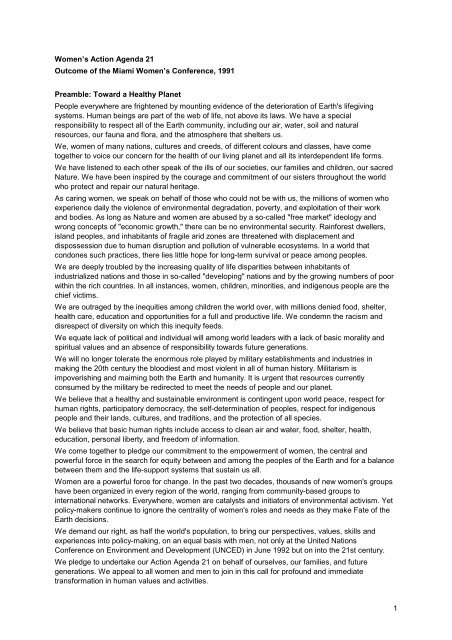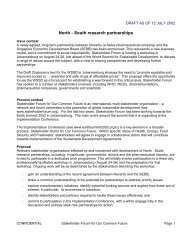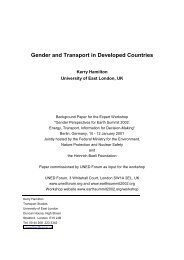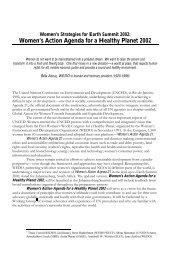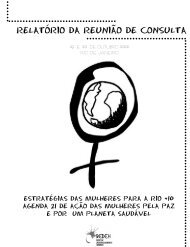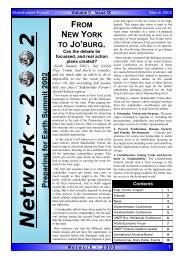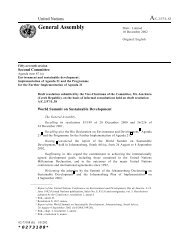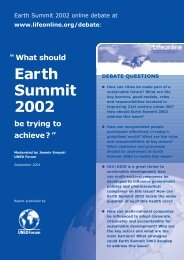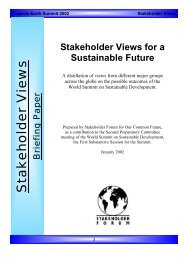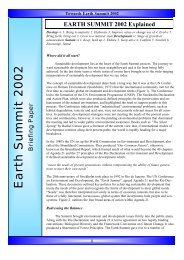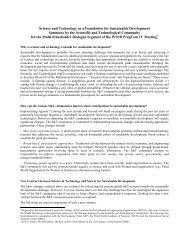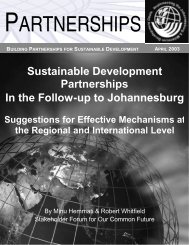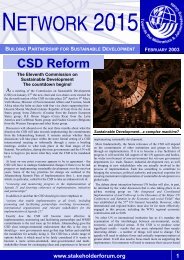Women's Action Agenda 1991 - Earth Summit 2002
Women's Action Agenda 1991 - Earth Summit 2002
Women's Action Agenda 1991 - Earth Summit 2002
Create successful ePaper yourself
Turn your PDF publications into a flip-book with our unique Google optimized e-Paper software.
Women’s <strong>Action</strong> <strong>Agenda</strong> 21<br />
Outcome of the Miami Women’s Conference, <strong>1991</strong><br />
Preamble: Toward a Healthy Planet<br />
People everywhere are frightened by mounting evidence of the deterioration of <strong>Earth</strong>'s lifegiving<br />
systems. Human beings are part of the web of life, not above its laws. We have a special<br />
responsibility to respect all of the <strong>Earth</strong> community, including our air, water, soil and natural<br />
resources, our fauna and flora, and the atmosphere that shelters us.<br />
We, women of many nations, cultures and creeds, of different colours and classes, have come<br />
together to voice our concern for the health of our living planet and all its interdependent life forms.<br />
We have listened to each other speak of the ills of our societies, our families and children, our sacred<br />
Nature. We have been inspired by the courage and commitment of our sisters throughout the world<br />
who protect and repair our natural heritage.<br />
As caring women, we speak on behalf of those who could not be with us, the millions of women who<br />
experience daily the violence of environmental degradation, poverty, and exploitation of their work<br />
and bodies. As long as Nature and women are abused by a so-called "free market" ideology and<br />
wrong concepts of "economic growth," there can be no environmental security. Rainforest dwellers,<br />
island peoples, and inhabitants of fragile arid zones are threatened with displacement and<br />
dispossession due to human disruption and pollution of vulnerable ecosystems. In a world that<br />
condones such practices, there lies little hope for long-term survival or peace among peoples.<br />
We are deeply troubled by the increasing quality of life disparities between inhabitants of<br />
industrialized nations and those in so-called "developing" nations and by the growing numbers of poor<br />
within the rich countries. In all instances, women, children, minorities, and indigenous people are the<br />
chief victims.<br />
We are outraged by the inequities among children the world over, with millions denied food, shelter,<br />
health care, education and opportunities for a full and productive life. We condemn the racism and<br />
disrespect of diversity on which this inequity feeds.<br />
We equate lack of political and individual will among world leaders with a lack of basic morality and<br />
spiritual values and an absence of responsibility towards future generations.<br />
We will no longer tolerate the enormous role played by military establishments and industries in<br />
making the 20th century the bloodiest and most violent in all of human history. Militarism is<br />
impoverishing and maiming both the <strong>Earth</strong> and humanity. It is urgent that resources currently<br />
consumed by the military be redirected to meet the needs of people and our planet.<br />
We believe that a healthy and sustainable environment is contingent upon world peace, respect for<br />
human rights, participatory democracy, the self-determination of peoples, respect for indigenous<br />
people and their lands, cultures, and traditions, and the protection of all species.<br />
We believe that basic human rights include access to clean air and water, food, shelter, health,<br />
education, personal liberty, and freedom of information.<br />
We come together to pledge our commitment to the empowerment of women, the central and<br />
powerful force in the search for equity between and among the peoples of the <strong>Earth</strong> and for a balance<br />
between them and the life-support systems that sustain us all.<br />
Women are a powerful force for change. In the past two decades, thousands of new women's groups<br />
have been organized in every region of the world, ranging from community-based groups to<br />
international networks. Everywhere, women are catalysts and initiators of environmental activism. Yet<br />
policy-makers continue to ignore the centrality of women's roles and needs as they make Fate of the<br />
<strong>Earth</strong> decisions.<br />
We demand our right, as half the world's population, to bring our perspectives, values, skills and<br />
experiences into policy-making, on an equal basis with men, not only at the United Nations<br />
Conference on Environment and Development (UNCED) in June 1992 but on into the 21st century.<br />
We pledge to undertake our <strong>Action</strong> <strong>Agenda</strong> 21 on behalf of ourselves, our families, and future<br />
generations. We appeal to all women and men to join in this call for profound and immediate<br />
transformation in human values and activities.<br />
1
<strong>Action</strong>s<br />
Democratic Rights, Diversity and Solidarity<br />
Recognizing that Nature is not limited by national sovereignty or boundaries and that environmental<br />
degradation is global,<br />
Observing the worldwide social and environmental consequences of development based solely on<br />
economic growth measurements,<br />
Recognizing the creative diversity of our culture, class, race, and the ecosystems and political<br />
structures within which we live,<br />
Believing that the world's indigenous peoples have long been denied basic human rights or<br />
acknowledgement of their contributions to world culture,<br />
Recognizing the interconnectedness of women, the environment, economic policies, development<br />
strategies, social justice and the survival of all species,<br />
We will promote the principles of this <strong>Action</strong> <strong>Agenda</strong> and encourage people everywhere to use<br />
political and economic means to make its recommendations a reality.<br />
We will seek to protect all those who uphold these principles from forces that would silence their<br />
voices or stand in the way of environmental and social justice.<br />
We will demand full and equal participation for women and men in public policy analyses, at senior<br />
levels in government and non-government organizations, in decision-making, implementation,<br />
administration, and funding at international, national, and community levels.<br />
We recommend that the democracy-strengthening principle observed in some nations - that no more<br />
than 60% or no less than 40% of either sex be included in government bodies - should be applied<br />
universally to all public policy-making groups. The guide to women's empowerment is achieving a<br />
critical mass of representation in decision-making, not mere tokenism. Gender balance must be<br />
observed in the national delegations to the UN Conference on Environment and Development<br />
(UNCED); in the permanent missions of UN member states; in the UN Secretariat's professional staff;<br />
in the World Court, World Bank, International Monetary Fund, and UN specialized agencies and<br />
programs.<br />
We demand that all governments comply with requirements of the Nairobi Forward-Looking Strategies<br />
for the Advancement of Women and that they ratify and implement the UN Convention on the<br />
Elimination of All Forms of Discrimination Against Women, the UN Convention on Human Rights, and<br />
the UN Convention on the Rights of the Child.<br />
We will organize groups to publicize, coordinate and assist women's action in issuing report cards on<br />
progress toward a health community, village, region, or nation.<br />
Code of Environmental Ethics and Accountability<br />
Recognizing the current moral and ethical double standards that are applied to environment and<br />
development activities, women's participation and social justice throughout the world,<br />
Recognizing that, in contrast, the women's global environmental model is cooperative rather than<br />
competitive, values women's roles, work, and participation, and acknowledges the responsibility that<br />
accompanies power and is owed to future generations,<br />
Believing that a universal code of ethics and international law should be based on equity, respect for<br />
humans and other species, and biologic and cultural diversity,<br />
Distressed that policy planners and political representatives use barren instruments (systems of<br />
national accounts) on which to make all major economic and environmental decisions,<br />
Insisting that national boundaries should not impede the development of global concepts of the<br />
environment and responsibility on a global level,<br />
We will work for adoption of an International Code of Environmental Conduct by business and<br />
industry, governments, UN agencies, and non-governmental organizations that includes<br />
2
precautionary and preventive approaches, considering the true value of the environment and the<br />
effect on women when planning activities that may affect the <strong>Earth</strong>,<br />
We support new principles of international environmental law, including: strict liability for<br />
environmental harms (the polluter pays), the intrinsic value of biodiversity, and non-adversarial<br />
dispute resolution mechanisms to include the public in decision-making about compensation for<br />
victims.<br />
We call for non-governmental monitoring systems that will hold institutions, corporations, states,<br />
organizations, and individuals accountable for their actions, products, and policies.<br />
We demand time-use studies of women's work (household, cottage industries, subsistence<br />
agriculture, child care, elder care, volunteer community service).<br />
We demand that qualitative indicators be used for environmental and natural resource<br />
measurements.<br />
We urge governments to agree to a timetable for implementation of full cost accounting that includes<br />
environmental and social costs - and assigns full value to women's labour - in national accounting<br />
systems and in calculation of subsidies and incentives in international trade.<br />
We require governments, the World Bank, International Monetary Fund, and lending agencies to<br />
establish environmental audits with which every funding proposal must comply before implementation<br />
of loans.<br />
Women, Militarism and the Environment<br />
Knowing that military expenditures, the international arms trade, and armed conflict deprive billions of<br />
human beings of basic security and well-being,<br />
Realizing the disastrous environmental impact of all military activity, including research, development,<br />
production of weaponry, testing, manoeuvres, presence of military bases, disposal of toxic materials,<br />
transport, and resource use,<br />
Aware that research on and use of military weaponry, including nuclear, chemical, and biological<br />
weapons, contribute significantly to environmental degradation, genetic mutation, illness, and death,<br />
Recognizing that militarism often leads to the occupation of lands and the denial of human and<br />
environmental rights,<br />
We call on UNCED to include in its <strong>Agenda</strong> 21 and final documents statements on the impact of<br />
militarism on the environment, development, and humanity and to support measures that will transfer<br />
the world's vast military resources to positive, life-enforcing programs.<br />
We urge an immediate 50% reduction in military spending, with the money saved reallocated to<br />
socially useful and environmentally friendly purposes.<br />
We demand creation of gender-balanced national civilian commissions that would open to public<br />
scrutiny all military activities, expenditures, and research and development.<br />
We demand that nuclear weapons be dismantled, that nuclear testing cease immediately, and a<br />
global nuclear test ban treaty be negotiated, signed, and enforced.<br />
We demand the cessation of space activities and supersonic flights that release carbon dioxide into<br />
the atmosphere and threaten the ozone layer.<br />
We demand that more decisive actions be taken to ban international traffic in nuclear, chemical,<br />
biological, and poison gas weapons or constituents of such weapons. Mechanisms should be<br />
developed for enforcement of this ban, whether against governments, businesses, or individuals.<br />
We support a UN commission report that recommended re-assigning military-related satellites and<br />
other information-gathering systems to monitor and share global environmental data.<br />
We demand that armies be used as environmental protection corps to monitor and repair damage to<br />
natural systems, including clean-up of war zones, military bases and surrounding areas, and to be<br />
available to assist citizens in times of natural and man-made disasters.<br />
We condemn governments that turn their armies against their citizens, causing millions of individuals<br />
to become refugees and displaced persons.<br />
3
We will educate our daughters and sons to shun military service if it is in the service of governments<br />
that use military power to exploit the resources and people of other nations.<br />
Foreign Debt and Trade<br />
In full knowledge that the industrialized nations have been the net beneficiaries of exploitation of the<br />
abundant natural resources of poor nations,<br />
Observing the disastrous social, environmental, and economic consequences of international lending<br />
practices and current terms of trade between industrialized and non-industrialized nations,<br />
Concerned about the negative impact on the poor, especially women and children, of theInternational<br />
Monetary Fund and World Bank structural adjustment policies,<br />
Appalled by the flow of capital from poor nations to the banking systems of rich nations, depriving<br />
them of funds for needed domestic, social, economic, health, and education programs,<br />
Recognizing the grievous consequences of this practice for poor families in the developing countries<br />
and for the natural resources upon which we all depend,<br />
We demand immediate official foreign debt cancellation.<br />
We will work for reduction of commercial debt via mechanisms equivalent to corporate<br />
bankruptcy law.<br />
We will cease to do business with banks that refuse to reduce the total owed and/or the interest rate<br />
on the whole debt owed by each of the poor nations.<br />
We will oppose those debt for nature exchanges (swaps) that are not subject to wide public debate<br />
and that threaten sovereignty and indigenous people's rights to land and self-determination.<br />
We will hold personally accountable corrupt officials, who borrow in the name of their people, for the<br />
social and environmental consequences of those loans and for personal misuse of such funds.<br />
We call for the rejection of structural adjustments policies (SAPs) that shift the responsibilities of basic<br />
social services from governments to women without compensation or assistance.<br />
We call for renegotiation of trade agreements to ensure an equitable relationship between the prices<br />
of raw materials and prices of manufactured goods.<br />
We call for the dismantling of all unfair protective trade measures used by the industrialized nations.<br />
We demand a total ban on the export of goods rejected for local consumption in or by the country of<br />
origin.<br />
We suggest that historic audits of nation states (from 1945 onward) be conducted to determine the<br />
net beneficiaries of natural resource exploitation, an assessment that would serve as the basis to<br />
cancel current foreign debt.<br />
Women, Poverty, Land Rights, Food Security and Credit<br />
Recognizing that while their living conditions deteriorate, women in many regions bear major<br />
responsibility for domestic food production (Africa, 80%; Asia, 60%; Latin America, over 40%) as well<br />
as for protection of soils and other natural resources,<br />
Noting that no one knows the realities of the over-exploitation of the land more intimately than the<br />
women who till it, draw and carry its water, use its trees for fuel, harvest forests for healing herbs and<br />
medicinal plants, and use their traditional knowledge for the benefit of the community, preserving<br />
species and ecosystems,<br />
Recognizing that in many communities the nutrition of the family depends upon women's ability to<br />
produce family and market food products,<br />
Aware that growing inequities in land tenure and ownership are the primary causes of women's<br />
poverty, emigration to urban slums, homelessness, environmental degradation, and the<br />
dispossession of indigenous people,<br />
Recognizing that current agricultural policies in the industrialized and developing nations are<br />
uprooting and displacing land-based communities and diverting land from food production to cash<br />
crops for export,<br />
4
We declare that because women and children are a majority of the one billion people in the world who<br />
go hungry every day, women's access to food, land inheritance, tenure, and ownership must be<br />
regarded as a basic human right.<br />
We call on the UN, governments and non-governmental organizations to cease discriminatory<br />
practices that limit women's access to land and other resources, to increase allocation of resources<br />
that enhance food security, and to provide appropriate technologies to reduce women's work.<br />
We will strive to create awareness of the environmental impact of land-use technologies guided by<br />
immediate profit at the cost of long-term sustainability and productivity.<br />
Policies should encourage use of indigenous foods and invest more resources to develop local<br />
expertise in traditional production, storage, and seed protection for future crops.<br />
We urge women everywhere to join an international campaign to support the women, men, and<br />
children dependent on tropical forests for their livelihoods and to help them protect and restore the<br />
forests, maintaining their communal rights to land the forest products. We recommend the World<br />
Rainforest Movement's statement on forests and forest peoples as a guide to action by UNCED at its<br />
meeting in Rio de Janeiro.<br />
We call on multilateral and bilateral development funds and programs and NGOs to promote women's<br />
access to credit. They should increase their support for microenterprise lending through women-run<br />
financial institutions as well as central banks in developing countries.<br />
We demand that women be given greater access to water and fuel supplies and to food processing<br />
technologies (e.g., grinding mills; processing and packaging; oil extraction) and be assisted in setting<br />
up food cooperatives, community kitchens, women-owned seed companies, and farmers' markets. To<br />
protect trees from being used as fuel, alternative energy sources should be developed, such as<br />
inexpensive, durable, heat-storing solar or photovoltaic household cooking stoves, or at minimum,<br />
fuel-saving biomass (woodfuel, charcoal, or waste) stoves.<br />
We reject as unacceptable the use of hormones, contaminants, additives, and irradiation in food<br />
production.<br />
We call for special attention to the needs of women and children in urban centres experiencing<br />
phenomenal population growth. In refugee camps and hostile urban environments, the majority are<br />
denied land titles, low-cost decent permanent housing, use of basic amenities, such as water,<br />
sanitation, energy, and transportation, and access to building materials and credit.<br />
We will campaign for the rights of urban populations not to be forcibly evicted from their homes and<br />
for their rights to use urban land for subsistence production of crops and livestock as well as smallscale<br />
trade and production, without harassment and with support from governments and international<br />
agencies.<br />
We urge UN member states to adopt and implement the UN Conference on Settlements (Habitat)<br />
Global Strategy for Shelter to the Year 2000, by strengthening women's involvement in the human<br />
settlements delivery process. Central government planning and implementation must involve local<br />
government and communities in these decisions, with non-governmental organizations functioning as<br />
a bridge between the official male-dominated policy-making mechanism and the practical approach of<br />
local communities and women's groups.<br />
We call for the transformation of development strategies and development cooperation agencies. In<br />
every new or already established aid-giving mechanism or program, policy that specifies the<br />
involvement of women on an equal basis with men in determining the allocation of funds should be<br />
enforced.<br />
We seek immediate enforcement of directives specifying that every funding proposal be examined for<br />
participation of women, including grass-roots women, in design and management, and for its impact<br />
on the economic, social, health and educational status for women as well as community-level and<br />
indigenous people.<br />
We demand that, to compensate for 46 years of under-funding the needs of women and their families,<br />
half of international development resources should be reaching women through broad-scale projects<br />
such as access to drinking water, upgrading technologies, and researching ways to reduce women's<br />
workloads.<br />
5
<strong>Women's</strong> Rights, Population Policies and Health<br />
Knowing that the major causes of environmental degradation are industrial and military pollutants,<br />
toxic wastes, and economic systems that exploit and misuse nature and people, we are outraged by<br />
suggestions that women's fertility rates (euphemistically called population pressures) are to blame,<br />
Recognizing that this analysis, if unchallenged, lays the groundwork for the re-emergence of to-down,<br />
demographically-driven population policies and programs that are deeply disrespectful of the basic<br />
human rights of women as guaranteed in the Convention on The Elimination of All Forms of<br />
Discrimination Against Women (CEDAW),<br />
Knowing that it is the number of people plus their consumption of resources plus their wastes that<br />
determine their environmental impact, we note that a person in the industrialized world has a far<br />
greater negative impact on the environment than a person living in a poor country,<br />
Aware that the right to reproductive health and choice is a basic human right of all individuals, we<br />
point out that the World Fertility Survey estimates that there are 500 million couples who wish to plan<br />
their family size but have no access to the means to do so,<br />
Fearful of the threat to women's lives by the HIV pandemic and recognizing that women's ability to<br />
protect themselves from AIDS and other sexually transmitted diseases and to determine when-and-if<br />
to have children is a prerequisite for women's health, self-determination, and empowerment,<br />
We condemn any attempt to deprive women of reproductive freedom or the knowledge to exercise<br />
that freedom.<br />
We demand women-centered, women-managed comprehensive reproductive health care and family<br />
planning, including the right to prenatal care, safe and legal voluntary contraceptives and abortion,<br />
sex education, and information.<br />
We urge governments, multilateral and donor agencies to increase investments in comprehensive<br />
reproductive health services and to include men as beneficiaries of family planning education and<br />
services. Family support services should include child care and parental leave.<br />
We call on policy-makers to recognize that raising the economic, health, education, and social status<br />
of women are essential to ending environmental degradation.<br />
We call for recognition of the existence of a global, environmentally induced cancer epidemic and<br />
demand removal from the environment of carcinogenic substances, which have particularly adverse<br />
effects on women and children. Particular attention in medical research and treatment should be paid<br />
to women's cancers: breast, ovarian, cervical, uterine, and vaginal. Research and remedial action<br />
should also focus on the effects on health of toxic chemicals, nuclear wastes, radiation, pesticides<br />
and fertilizers.<br />
We demand that all governments systematically alert their citizens to the danger of AIDS and provide<br />
them with the information on how to avoid contamination.<br />
We ask the World Health Organization, International Labour Organization, the Food and Agriculture<br />
Organization, national governments, public health groups, corporations and unions to increase efforts<br />
to eliminate environmental occupational hazards in factories, offices, and on the land.<br />
Biodiversity and Biotechnology<br />
Concerned by the deterioration of habitats and ecosystems that are home to the millions of species<br />
with which we share the <strong>Earth</strong>,<br />
Realizing the tragic loss of species upon which our interdependent ecosystems depend,<br />
Recognizing the treasure of plant and animal knowledge that is tended and passed on by the<br />
indigenous people of the world,<br />
Knowing the attempt of commercial interests of the industrialized nations and multinationals to control<br />
the natural heritage of species in the nations of the South through patenting life forms and attempting<br />
to control gene banks,<br />
Aware that genetically engineered organisms released into the environment pose a threat to natural<br />
biologic diversity,<br />
6
We insist that the UNCED Convention on Biological Diversity address the risks of biotechnology as<br />
well as the conservation of species.<br />
We are concerned about genetic engineering in agriculture and oppose the release of genetically<br />
manipulated organisms into the environment. Since research and development of genetic engineering<br />
in plants, bacteria and viruses, and animals is proceeding and in some cases products have been<br />
commercialized.<br />
We call for immediate and direct regulation of research and development in biotechnology, and ask<br />
that a citizens' board with independent science advisers be included in the review and approval<br />
process of all biotechnologies by governments.<br />
We recommend that new biotechnologies be evaluated for whether or not they are appropriate and<br />
sustainable for humans and the environment. This means the approval process must include not only<br />
the examination of their efficacy, safety, and quality, but also an evaluation of their social and<br />
economic impacts on those who use and are affected by the technologies.<br />
We demand that the testing and release or organisms be done only in the country of origin and that<br />
biotechnology products that are not yet approved or are restricted in the country or origin be<br />
prohibited from use or sale elsewhere.<br />
We recommend that there be no patenting of life forms or life form technology, including nonregenerating<br />
seeds, to protect against the commercial exploitation of local farmers and the genetic<br />
resources of developing nations.<br />
We will work for a ban on bovine growth hormone, for a boycott of dairy products with BGH, and for<br />
labeling requirements in the interim.<br />
We insist that information on the risks of biotechnology be made widely available in clear laypersons's<br />
language.<br />
We recommend that every country and international development agency seek to reroute agriculture<br />
on a sustainable path by supporting and educating farmers in organic and integrated pest<br />
management methods and by changing national and aid policies that subsidize chemical and genetic<br />
engineering-based agriculture.<br />
We will support indigenous people in their efforts to protect their natural environments. Aboriginal and<br />
indigenous peoples, and specifically women, must be recognized as providing vital wisdom and<br />
leadership in resisting the destruction of the <strong>Earth</strong> and its creatures, and in creating a new, lifeaffirming<br />
global reality.<br />
We call for a redefinition of biology, one that gives priority to conservation biology and ecology and<br />
stops the trend in reductionist methods at the gene and molecular level, a trend that negates the<br />
primacy of the organism and ecosystem.<br />
Nuclear Power and Alternative Energy<br />
Noting alarming increases in levels of radiation from man-made sources in our air, water, soil, and<br />
space,<br />
Concerned at the rising death toll from nuclear power accidents, exposure to nuclear wastes and<br />
other radiation emissions,<br />
Aware that women's breasts and uterine tissue, fetuses, and children are particularly vulnerable to<br />
radiation-induced cancers and disease,<br />
We urge that new nuclear research, development, production, and use be stopped, that uranium<br />
mining be halted, and that nuclear power production and use be phased out and replaced by<br />
environment-friendly energy sources.<br />
We deplore the environmental racism responsible for the dumping, siting, or placement of<br />
environmentally hazardous facilities in the communities of colour around the world, including those in<br />
North America.<br />
We demand that export of radioactive and other toxic wastes to countries of the South and<br />
communities of colour be stopped and that the nations responsible for such wastes be responsible for<br />
cleaning them up.<br />
7
We call for a ban on food irradiation and urge support for research into alternative medical diagnostic<br />
and healing methods that do not involve the use of radiation.<br />
We propose that energy efficiency, conservation, and self-renewing sources such as sun, wind, and<br />
water be implemented globally as an alternative to nuclear power and fossil fuels. Available<br />
technology for these alternatives should be refined and implemented and retraining programs provide<br />
for workers displaced by this transition.<br />
We call for promotion of mass transportation systems, including accommodations for bicycles,<br />
reducing reliance on fossil-fuel cars, and development of more energy-efficient motor vehicles.<br />
We propose that a curriculum be developed and taught in every language in all schools throughout<br />
the world to educate and protect present and future generations from the risks of radiation exposure<br />
and contamination.<br />
Science and Technology Transfer<br />
Believing that science and technology should be at the service of the many rather than for the benefit<br />
of the few,<br />
Observing that, on the contrary, they are used to "harness" Nature, contributing to the degradation of<br />
ecosystems for short-term profit,<br />
Aware that a very small proportion of the world's research and development resources are devoted to<br />
meeting basic needs of the rural poor,<br />
Witnessing the disempowerment of women through lack of access to appropriate and sustainable<br />
technology and the disregard for women's wealth of experiential knowledge,<br />
Observing that all too often women have been the victims of the misuse of scientific discoveries and<br />
inappropriate technologies,<br />
We urge the marriage of ethical values with scientific investigation and use, and the development of<br />
people-friendly, non-violent criteria for all technologies, including their appropriateness for both<br />
women and the environment.<br />
We demand that all technology transfer be appropriate and sustainable, with special attention paid to<br />
longterm costs and benefits for people and the environment. Resources must be made available for<br />
research and development of technologies appropriate for women.<br />
We urge that developing nations, and particularly women, be provided with immediate access to<br />
appropriate technologies that lead to provision of safe water for drinking and farming; transport;<br />
renewable energy sources; sustainable agriculture practices; and basic health care, such as<br />
sanitation and vaccinations for children. Benign technology transfer should include public<br />
transportation and computer technology and training, with guarantees that computer data and other<br />
information technologies not be used to violate rights to privacy and security.<br />
We will support and promote communications strategies for disseminating information on appropriate<br />
and inappropriate technologies to women worldwide. The flow of information should be South-South,<br />
as well as North-South and South-North.<br />
We call for more education and training of women and girls in the sciences and technology worldwide<br />
and emphasize the need for training women in the developing countries at college and university<br />
levels.<br />
We urge the UN, governments and non-governmental organizations to create rural and urban training<br />
centers of excellence, North and South, that will serve to disseminate environment-friendly<br />
technologies to women.<br />
<strong>Women's</strong> Consumer Power<br />
Recognizing that women are powerful catalysts, as individuals and in groups, in creating a healthier<br />
planet for ourselves, our families, our communities, and nations,<br />
Believing that our spending choices should express concern for environmental protection,<br />
Aware that the power of the consumer is decisive in industrial planning and production,<br />
8
Believing that women can use their consumer power to enforce environmentally and socially friendly<br />
industrial development,<br />
Noting that many products bought by women in industrialized nations are based on low wages and<br />
hazardous working conditions of women in poor countries and communities,<br />
We pledge to act in solidarity with women around the world to change policies responsible for<br />
economic, social, and political inequities and restore our planet to health.<br />
We will form and strengthen existing networks among women globally to facilitate the analysis of<br />
consumer goods, from the extraction of raw materials through production processes to use and<br />
disposal - to measure holistically the environmental, socio-economic, and health impacts of a product.<br />
We will engage in campaigns supporting investment in environmentally sound productive activities<br />
and encourage initiatives to reduce fossil fuel energy use, overconsumption, and wastes.<br />
We pledge to use women's enormous consumer power to boycott businesses and institutions that are<br />
not eco-conscious and to support and commend those that are.<br />
We pledge to reduce paper consumption and to promote precycling - not just recycling used products<br />
but developing reusable products.<br />
We will organize campaigns against siting sewage treatment plants and incinerators in poor urban<br />
communities and seek non-polluting solid waste management planning and restrictions on mercury<br />
emission restrictions.<br />
We will seek to reduce the use of cars and encourage the use of public transport systems,<br />
redesigning them to reduce energy consumption, and focus on safety and accessibility to those<br />
who experience difficulty in using mass transportation<br />
We will choose natural products, avoiding those based on animal testing or toxic chemicals, and seek<br />
safer food products.<br />
We advocate development of retraining programs and creation of new socially useful job opportunities<br />
for those displaced by the transition to more eco-friendly societies.<br />
Information and Education<br />
Believing it is a basic human right to have access to unbiased information about the quality of the<br />
environment in which we live,<br />
Recognizing the risk that the media may become dominated by forces which perpetuate a world view<br />
that ignores cultural diversity and integrity,<br />
Believing that only through wide dissemination of information on environmental and developmental<br />
issues will we be able to confront the challenges of environmental decline,<br />
Aware that information concerning the environmental and health impact of military and industrial byproducts<br />
is often classified as secret for national security or propriety reasons,<br />
We invite the media to join with us in promoting the principles of this <strong>Action</strong> <strong>Agenda</strong>.<br />
We demand that the UN monitor all activities of governments that threaten the environment, including<br />
space and ocean probing, and make information about such activities known to the world community.<br />
We will work to create and strengthen formal and informal information systems and exchanges that<br />
adhere to the principles of openness and inclusiveness, giving voice to the majority of citizens, of<br />
reporting on violations of human and environmental rights.<br />
We recommend that all countries offer environmental education at the primary and secondary levels,<br />
including ecology and consumer education.<br />
We will promote environmental ethics education in our schools and in informal learning settings with<br />
the purpose of promoting harmony between all living systems and solidarity among peoples.<br />
We strongly support the establishment of a non-governmental organization whose mandate and<br />
cooperation on environmental emergencies and environmental rights would be similar to those of<br />
Amnesty International.<br />
9
Recommendations to the United Nations<br />
Realizing that there may be an attempt to create new institutions to manage the world's ecosystem<br />
based on the current "economic growth" model,<br />
Believing that such institutions might not have as their primary objective the long-term sustainability of<br />
the <strong>Earth</strong>'s species and ecosystems,<br />
We call instead for the creation of a permanent gender-balanced UN Commission on Environment<br />
and Development (analogous to the UN Commission on Human Rights) to promote environmental<br />
awareness and to station ombudspersons in every region of the world, to receive and investigate<br />
NGO, group, and individual complaints about environmental hazards, maldevelopment, government,<br />
and private misuse of UN and international aid funds and violations of UN conventions, treaties, and<br />
international law. Its duties should include monitoring compliance and enforcing principles of an<br />
International Code of Environmental Conduct.<br />
We call for improvement of prevailing staff gender ratios in the UN system, noting that only some 4%<br />
of policy-making positions are currently held by women. Equitable gender representation must be of<br />
equal importance with equitable geographic representation until gender parity is achieved.<br />
We urge governments to increase their contributions to and support of the UN Environment<br />
Programme (UNEP), which Assists governments in environmental assessment, undertakes studies,<br />
training, and major environmental management tasks, and negotiates and facilitates international<br />
environmental law. Its budget should be increased, to triple its current $40 million a year.<br />
We recommend that UNEP expand its efforts to benefit from the knowledge and experience of female<br />
staff members, consultants and its Senior <strong>Women's</strong> Advisory Group by actively pursuing a policy of<br />
gender balance in policy-making. It should require a women's focal point in every regional and<br />
outposted office of UNEP to provide information and funding and help empower women in<br />
environmental management.<br />
We appeal to donor countries to increase their contributions to UNIFEM, the only multilateral fund<br />
established specifically to increase the flow of development resources to women in low income<br />
countries, so as to reach a level of $150 million annually by the year 2000. These funds are essential<br />
if UNIFEM is to enhance its catalytic role in providing resources and empowerment to poor women.<br />
We urge all UN agencies to increase their commitment to integrating women's perspectives at all<br />
levels and in all programs and policies.<br />
We support the recommendations of a "swords into ploughshares" report by a UN study group on<br />
"Charting Potential Uses of Military Resources for Civilian Endeavors to Protect the Environment." It<br />
proposes developing mechanisms for transferring to environmental protection and development<br />
programs some of the world's vast military resources.<br />
The UN Conference on Environment and Development (UNCED)<br />
We pledge to lobby our national governments to include equal numbers of women, as well as<br />
representatives of indigenous peoples and grassroots organizations, in their delegations to UNCED<br />
Preparatory Committee meetings and to the June 1992 UN conference in Rio de Janeiro.<br />
We will conduct briefings for UNCED participants and press them to incorporate our <strong>Women's</strong> <strong>Action</strong><br />
<strong>Agenda</strong> 21 into UNCED's <strong>Earth</strong> Charter, Rio Declaration, <strong>Agenda</strong> 21 and other UNCED documents.<br />
We will distribute our <strong>Action</strong> <strong>Agenda</strong> widely to our governments, to non-governmental organizations,<br />
to multi-lateral agencies, business and industrial leaders, and to the formal and informal networks we<br />
maintain.<br />
We will make subsequent recommendations regarding governmental and non-governmental<br />
contributions to the UNCED process, including implementation and monitoring of its decisions.<br />
We call on world leaders attending the 1992 <strong>Earth</strong> <strong>Summit</strong> to sign a Global Climate Change<br />
Convention (with industrialized countries making a minimum commitment to a 20% reduction of<br />
carbon dioxide by the year 2000 and a Convention on Biological Diversity). New agreements are also<br />
needed on the safeguarding of forests and the conservation of Antarctica.<br />
10
We pledge to be present in large numbers at the <strong>Earth</strong> <strong>Summit</strong> and Global Forum in Rio de Janeiro.<br />
We remind the policy-makers that the women of the world intend to participate in decisions made at<br />
UNCED and afterward about the fate of our <strong>Earth</strong>.<br />
We submit these recommendations as a basic guide to our efforts to promote environmental and<br />
economic security now and on into the 21st Century.<br />
The World <strong>Women's</strong> Congress <strong>Action</strong> <strong>Agenda</strong> is a compilation of the work, ideas, and values of 1500<br />
women from around the world, North and South, East and West. It represents the essence of four<br />
days of expert testimony, jury panels, and workshop discussions that are distilled in this document. It<br />
does not necessarily represent the views of each and every individual who participated in the process.<br />
It is meant as a challenge to women and men to work together to create a safe and sustainable<br />
future.<br />
We call on UNCED to include in its <strong>Agenda</strong> 21 and final documents statements on the impact of<br />
militarism on the environment, development, and humanity and to support measures that will transfer<br />
the world's vast military resources to positive, life-enforcing programs.<br />
11


